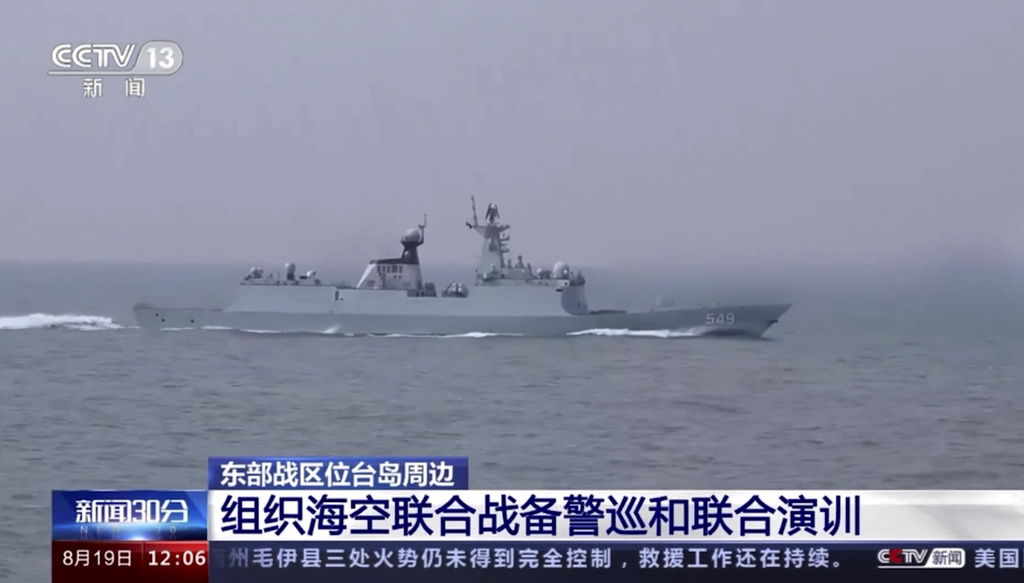Communist China, Enraged by Taiwanese Vice President’s Visit to America, Unleashes ‘Fruit Diplomacy’ by Banning Mango Imports
The fruit ban goes with Chinese military drills against Taiwan, as intense war games begin on and around the Korean peninsula.

Call it “fruit diplomacy.” That’s how the Republic of China on Taiwan describes Beijing suspending the import of mangoes from the island democracy in a fit of rage over “stopovers” in America by Taiwan’s vice president.
The fruit ban accompanied aggressive military exercises by Communist China against Taiwan even as intense war games opened among American, South Korean, and North Korean forces on and around the Korean peninsula.
China chose to make a fuss after Vice President Lai Ching-te stopped over at New York and San Francisco last week on his way to and from the inauguration of the president of Paraguay, one of a dozen countries with which Taiwan has diplomatic relations.
In barring the import of Taiwan-grown mangoes, China claimed they were infested by bugs. Taiwan’s agricultural ministry accused China of “arbitrarily disrupting trade” in a game of “fruit diplomacy.”
At the same time, the Chinese propaganda organ Global Times gloated, “The Chinese People’s Liberation Army launched a sudden and swift joint exercise” around Taiwan “that was not anticipated by the island’s defense authority.”

The paper charged that Mr. Lai, who is running for president of Taiwan in elections in January, favors formal independence of Taiwan from China — an affront to the mystique that Taiwan is a Chinese province that President Xi vows to recover.
The drills, Global Times bragged, “displayed the PLA’s growing combat readiness and its capability to completely control the region.” The “rapid maneuvers” of destroyers, frigates, missile boats, fighter jets, electronic warfare aircraft, and missile units, the PLA command said, were a warning against “separatist forces advocating ‘Taiwan independence.’”
Simultaneously, American, South Korean, and North Korean forces were blasting away — albeit not at each other. The Americans and South Koreans on Monday opened 10 days of the biggest joint exercises they’ve ever staged, while the North Koreans tested cruise missiles under the watchful eye of the strongman, Kim Jong-un.
Non-lethal though the war games might be, all sides were playing them as though they were fighting a real war.
Pyongyang’s Korean Central News Agency crowed that Mr. Kim visited a ship from which seamen, firing cruise missiles as “in actual war,” had “rapidly hit targets.”
U.S. Forces Korea was more modest, saying that American and Korean air, navy and ground forces were coordinating under combat conditions. The South Korean command promised the “high-intensity, thorough” exercises would show its forces could “overwhelmingly” defeat whatever Mr. Kim has in mind.
America and the two Koreas were playing at war just after the trilateral summit at which President Biden got the leaders of South Korea and Japan to agree to bury historical animosity and cooperate closely against their enemies.
The Americans and South Koreans had announced the exercises, Ulchi Freedom Shield, well before the summit, but was the trilateral parley timed to precede them?
American and South Korean commanders appeared to be delighted by the war games after they were suspended by a former South Korean president, Moon Jae-in, while he was begging Mr. Kim for North-South reconciliation. South Korea’s president, Yoon Suk-yeol, has reversed that policy since his election in March of last year.
Some analysts, though, wondered if the trilateral summit, hosted by President Biden at Camp David in low-lying mountains 65 miles northwest of Washington, had worsened an atmosphere seething with rising tensions.
A professor at George Washington University, Mike Mochizuki, citing the danger of “a negative consequence of the Camp David summit,” warned it could “intensify the confrontation or divide between the United States, Japan and South Korea on the one hand and China, North Korea and Russia on the other.”
Mr. Mochizuki told PBS that “the other trilateral” — China, Russia, and North Korea — “could respond in ways that could actually undermine the security of Japan and South Korea.”
That Mr. Yoon and Japan’s prime minister, Fumio Kishida, were cooperating, he said, “would most anger the Chinese,” which had “finished its own exercises with Russia.”
China, as expected, saw the summit as an attempt by Washington to form an alliance in Asia similar to the North Atlantic Treaty Organization that binds America and 31 others in common cause against Russia’s invasion of Ukraine.
“Camp David summit serves as hypocritical anti-China pantomime with a ‘mini-NATO’ in the making,” a Global Times headline said. For now, though, China appears more concerned about Mr. Lai setting foot on American soil.

